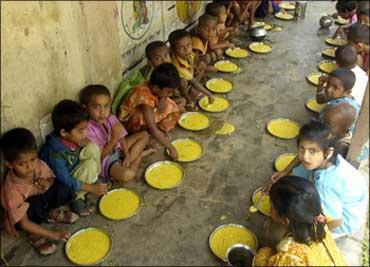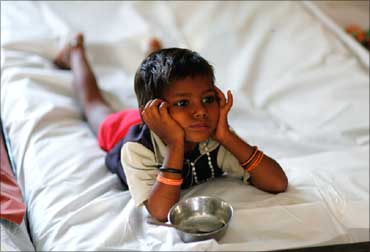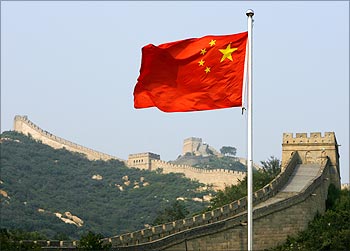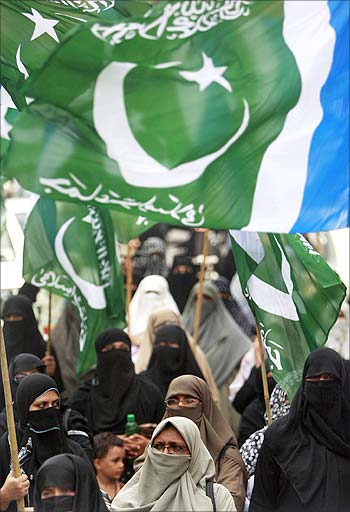Photographs: Jayanta Dey/Reuters
India has been ranked 67, way below neighbouring countries like China and Pakistan, in a new global hunger index by the International Food Policy Research Institute.
The index, released on Monday, rated 84 countries on the basis of three leading indicators -- prevalence of child malnutrition, rate of child mortality, and the proportion of people who are calorie deficient.
China is rated much ahead of India at the ninth place.
The 2010 Global Hunger Index, released by the International Food Policy Research Institute in association with a German group Concern Worldwide and Welthungerhilfe, ranks countries on a 100 point scale, with 0 being the best score ('no hunger') and 100 being the worst, though neither of these extremes is achieved in practice.
The higher the score, the worse the food situation of a country. Values less than 4.9 reflect 'low hunger', values between 5 and 9.9 reflect 'moderate hunger', values between 10 and 19.9 indicate a 'serious', values between 20 and 29.9 are 'alarming', and values exceeding 30 are 'extremely alarming' hunger problem.
. . .
Hunger index: India ranks below China, Pak
Image: A malnourished child waits for food at the Nutritional Rehabilitation Centre in Madhya Pradesh.Photographs: Reinhard Krause/Reuters
India: Rank 67
India is at a crucial turning point with a few successes and some failures. Persistent inequalities, ineffective delivery of public services, weak accountability systems and gaps in the implementation of pro-poor policies are the major bottlenecks to progress.
With just five years to the 2015 deadline for achieving the millenium development goals, the country as a whole will not be on track for a majority of the targets related to poverty, hunger, health, gender equality and environmental sustainability unless concerted national efforts are made by government and all sections of civil-society working in tandem.
This year's hunger figure marked a nearly10 per cent decline from the 2009 level, with the reduction concentrated in Asia, where 80 million fewer people are estimated to be going hungry this year.
According to the 2009 Global Hunger Index, India ranked 65 out of 88 countries.
. . .
Hunger index: India ranks below China, Pak
Image: A Chinese flag flies in front of the Great Wall of China.Photographs: David Gray/Reuters
China: Rank 9
China has made phenomenal progress in fighting poverty and especially hunger.
In 2008, it stood at the 15th spot with a hunger rate of 7.1 points.
In 2009, it jumped up to the 5th position with a hunger rate of 5.7, even though it has a huge population.
However, this year, it ranked 9 in the index.
China's economy is among fastest growing in the world. It is fourth most visited countries in the world with 62 million inbound international visitors in 2008.
It is a member of the WTO and is the world's third largest trading power behind the US and Germany. It is among the world's favourite destination for foreign direct investment.
. . .
Hunger index: India ranks below China, Pak
Image: A buddhist monk walks into a temple in Colombo.Photographs: Zainal Abd Halim/Reuters
Sri Lanka: Rank 39
Sri Lanka has an agrarian economy and is heavily dependent on tourism too.
Its most widely known export is tea.
Last year, the country ranked 35 in the index.
The nation also has a booming export sector, with textiles exports being one of the mainstays of the economy. Fishing, petroleum, industry too add to the nation's economy.
. . .
Hunger index: India ranks below China, Pak
Image: Female supporters of Jamaat-e-Islami, a Islamic political party, wave their party flags in Karachi.Photographs: Athar Hussain/Reuters
Pakistan: Rank 52
Last year, Pakistan ranked 58.
Pakistan's economic growth rate is much lower than India's, but the Asian nation seems to have done better than its neighbour at curbing hunger.
The Pakistani economy is mainly agrarian in nature, although the services sector has been rising rapidly in the last few years.
The country is also getting a lot of foreign investment in its telecommunications, manufacturing, real estate and power sectors.
. . .
Hunger index: India ranks below China, Pak
Image: Raghavendra Bhatt (in red) offers prayers at Pashupatinat temple.Photographs: Shruti Shrestha/ Reuters
Nepal: Rank 56
Nepal is the 115th-largest economy in the world with agriculture accounting for about 40 per cent of the country's gross domestic product.
Agriculture employs 76 per cent of the workforce, services 18 per cent and manufacturing/craft-based industry 6 per cent.
Nepal's workforce of about 10 million suffers from a severe shortage of skilled labour.
Despite spectacular landscape, but growth in hospitality and tourism industry has been stifled by disturbing political events.
The rate of unemployment and underemployment approaches half of the working-age population. Thus many Nepali citizens move to India in search of work.
. . .
Hunger index: India ranks below China, Pak
Image: A customer tries on a prayer cap at the new market area in Dhaka.Photographs: Andrew Biraj/Reuters
Bangladesh: Rank 68
Bangladesh is one of the poorest and most corrupt nations in the world. It is also one of the hungriest with a hunger rate of 24.7.
With most of its working population consisting of farmers, Bangladesh is primarily an agrarian society. However, agriculture is not a very productive occupation for the nation, as millions in the country go hungry everyday.
Rice and tea are the nation's major exports, but the country's major portion of exports earnings are generated from its booming textiles and garment industry.
In recent times, Bangladesh has been a magnet for foreign investment and MNCs which have been setting up base there.








article